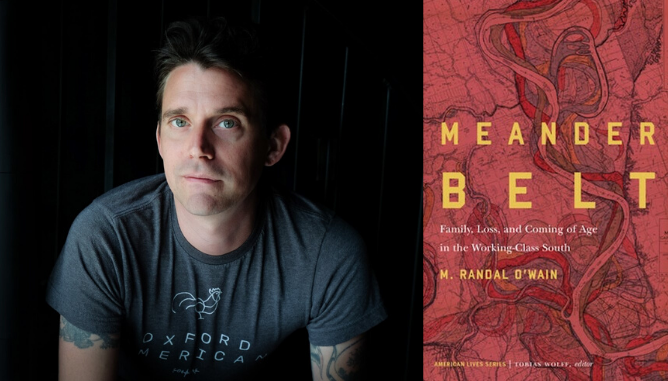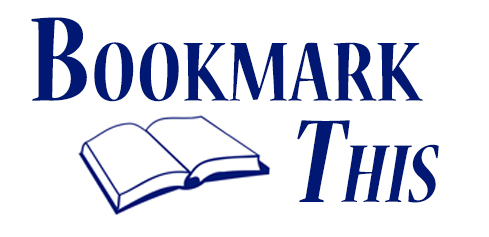
Bookmark This is a feature that highlights new books by College of Arts & Sciences faculty and alumni, published on the first Friday of every month.
 Featured book: Meander Belt: Family, Loss and Coming of Age in the Working-Class South (University of Nebraska Press, October 2019) by M. Randal O’Wain.
Featured book: Meander Belt: Family, Loss and Coming of Age in the Working-Class South (University of Nebraska Press, October 2019) by M. Randal O’Wain.
Q: Can you give us a brief synopsis of your book?
A: I find this question to be very difficult. It took me seven years to write Meander Belt, which is a slim essay collection with the narrative scope of a memoir. Seven years! It took this long because the story I grappled with had so many layers, facets and tensions.
If I were to follow the elevator pitch model, I’d say Meander Belt is a book about grief, a book that seeks to understand family and place in light of the deaths of my brother and father. I come from a working class family where physical labor and a near-religious obsession with work is favored over artistic or intellectual labors. I had to move away from home to figure out how to grow as an artist and academic, because there were no models in my family. This sent me all over the country mostly traveling as a touring musician. And so Meander Belt is also about the ways in which one learns to be an individual and how that, for me, worked against what was valued most in my family: undivided loyalty.
Q: How does this fit in with your research interests and passions?
A: In both my fiction and nonfiction, I am obsessed with vulnerability. I often find that we are at our most human after we’ve made a mistake, love or have fallen out of love, acted beneficently when wronged or cruelly when treated with kindness. We humans, and I am grossly generalizing here, are stupidly complicated, and we are never one personality. We are cruel as well as honorable, cynical and optimistic, joyful and angry.
Forgive me for sounding like an armchair philosopher, but it’s my way of saying that “research” for Meander Belt was all about studying the evidence within my boyhood that created the tensions within how I responded to family and home — primarily why was it so important for that boy to leave his family and the safety and love they provided? This meant that I had to witness my past objectively. I had to view my mistakes, hardships, loves and all of my vulnerabilities with compassion. I used photos, letters, journal entries, phone conversation and memory, of course, to access the mind of that boy, and I worked very hard to present the narrative with honesty and authenticity.
Q: What was the original idea that made you think: “There’s a book here?”
A; The first essay I wrote was meant to be my brother’s eulogy, but when the time came, at his funeral, I couldn’t read it out loud. It’s called “Dear Brother,” and in the beginning it was just a collection of memories that had little order outside of the eulogy format. Then, a few weeks later, his girlfriend gave me a plastic pencil box, red, but with the top blacked out and I distinctly remembered him coloring this lid when we were both still in elementary school. It was full of strange things now, like, Zippos and a cassette, a photo of him on his 13th birthday holding Poison’s album Flesh and Blood in his mouth (my gift to him) and a red Fender guitar strapped to his shoulder.
Anyway, after writing “Dear Brother,” I couldn’t stop revisiting memories on the page of him and my father. I resisted the genre of memoir back then and tried to turn these very true, personal stories into fiction. But those stories were terrible! I didn’t know what I was doing, and so I applied to Iowa’s Nonfiction Writing Program, was accepted and wrote Meander Belt as I learned more about the complex, multi-faceted moniker of creative nonfiction.
Q: What surprised you when researching/writing this book?
A: I learned more about writing fiction by writing nonfiction than I had before because the act of conveying “truth” through narrative is a very difficult balancing act. The material for the story is all there, but the writer has to mine memories in order to find the right anecdote, situation, interaction that will stand in as representative for the entire experience, an entire personality or life lived.
But what really surprised me was that when I first started writing the book it was very emotional, very difficult. I felt memories of my father and brother in my body, as a physical sensation. At one point, I no longer felt my memory as something separate from the book. I didn’t realize this had happened until I’d come across an envelope with an itemized list of my father’s income the year he died. I remembered that I’d asked him to send it to me after he’d been fired when he’d had a spinal injury on the job. At the time, as the itemized list proved, they were living off my mother’s social security at a whopping $545 a month. There was no note, just the document. I found this and was so immediately flooded with emotions surrounding the memory of calling and asking my working class father to send me proof of his poverty that I bawled and it was beautiful. I was grateful for that deep, emotional response to that challenging memory.
Q: Where’s your go-to writing spot, and how do you deal with writer’s block?
A: I can work pretty much anywhere as long as I have ear plugs to block out the sound. But I really love writing in hotel rooms!
This sounds arrogant, I know, but I don’t have writer’s block. I sit down to work everyday, and as long as I do that, the writing gets done. Sure, there are some days when I will sit there for a couple of hours and not get any words on the page, but that’s all part of the process. And if I don’t know what to do or how to move forward on an essay or story, then often times I was never ready to start that project in the first place. So I move on and find something I am ready to work on.
O’Wain is assistant teaching professor in the department of English and comparative literature.
Nominate a book we should feature (published in about the last six months) by emailing college-news@unc.edu. Find some great books to add to your reading list by checking out our College books page.
